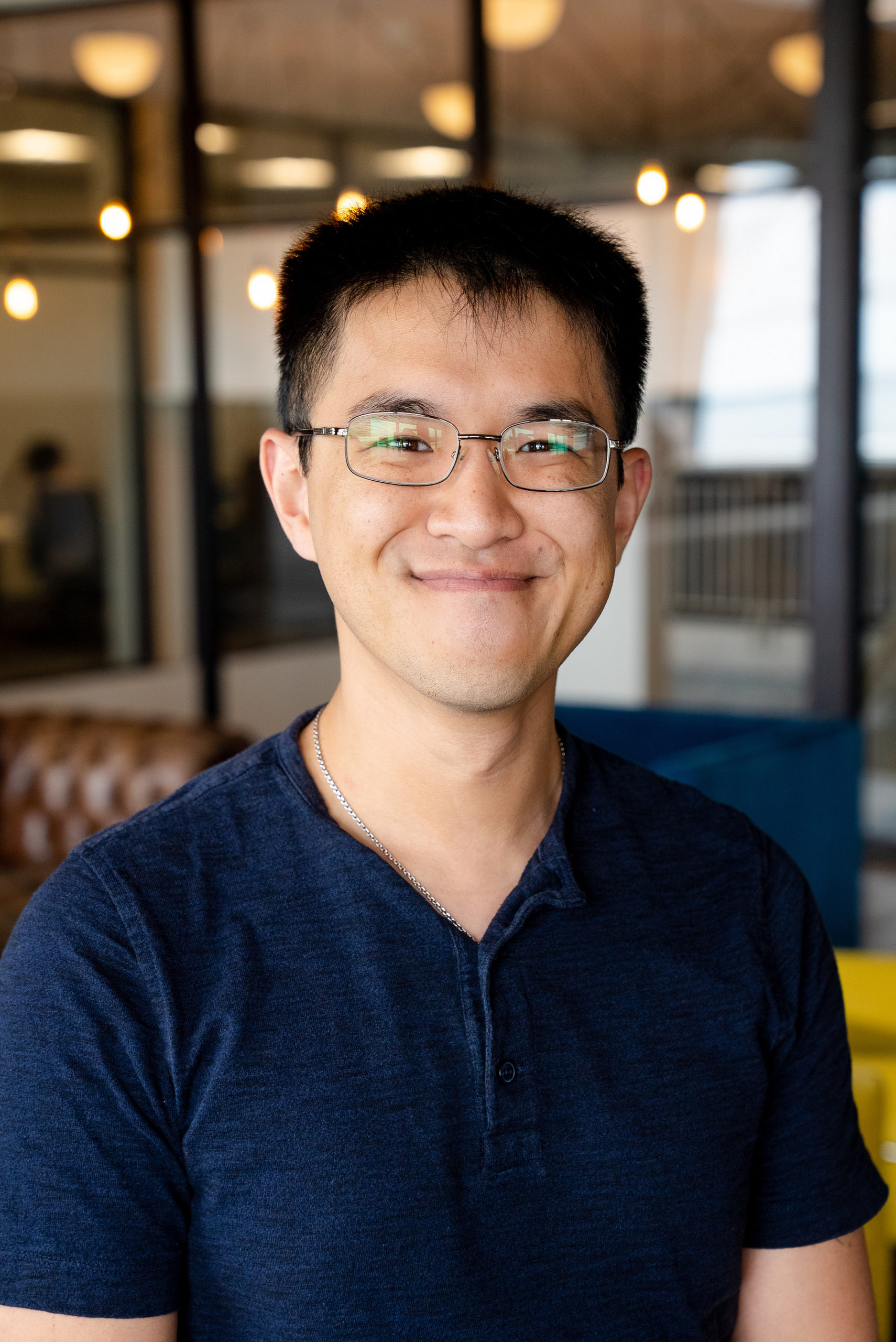The time to try something new might be right now.
Tech industry employment has been on the up since the earliest days of the pandemic, rising steadily from the summer of 2020 to now. In the past year alone, that’s meant a boost of 143,700 jobs for a 55% year-over-year increase, per CompTIA. That means there’s plenty opportunity at hand for those professionals who are choosing to leave established careers to pursue jobs in the tech field.
Technical.ly spoke to four people who made that choice and are either in a new position or actively searching for one. Here’s why they made the leap, paired with their advice for others looking to do the same.
Gavin Huang: ‘It’s never too late’ to pursue a tech career
Gavin Huang left his job at a federal agency and became an associate UX engineer at Chester’s Power Home Remodeling in early 2022. Huang had spent six years with the government and eventually worked his way up to leading a team managing drinking water grants for five states.
But he said the federal job wasn’t quite what he hoped it would be. He was craving a faster-paced environment and he didn’t really want to go any further in his career as a grant coordinator.
“I was seeking a creative outlet and I had always been interested in computer science — and to be honest, if I could go back to college and do it all over again, I’d definitely major in comp sci,” he said. “To me, what the tech industry represents is a way to always innovate yourself. It’s constantly changing.”
So, he started teaching himself how to program during the pandemic. He took some courses and watched YouTube videos, but nothing really stuck until he learned full-stack web development from the free, open-source Odin Project. After completing just half the course, he started networking to look for a job.

Gavin Huang. (Courtesy photo)
In scanning LinkedIn, he said, he found a past colleague from 10 years ago who eventually put him in contact with his current boss. In February, he was hired.
“That whole process, it was a shot in the dark,” he said. “But yeah, it’s what I did to just try to break into the industry because that was definitely the hardest part. You could apply to jobs, but there’s like 300 people applying for entry-level positions. And I think that’s what makes it difficult to break into the industry.”
Huang saw freedom in switching to a tech job, in the sense that he could move around, “innovate” himself and try a new type of work — something he thought his government job was missing.
Huang said he loves his current role. The advice he would give to others leaving a career to pursue another: Don’t give up if you’re serious.
“Don’t let those bad thoughts get in your head and discourage you,” he said. “Today’s a very good day to reinvent yourself and change your life. It’s never too late.”
Jessica Clay: Explore all your options first
Jessica Clay is a special education teacher looking to finalize her move into the tech industry. Back in 2018, Clay said, she noticed that working with technology gave her a different feeling than working in the classroom did. She said she loves education, but tech didn’t feel as much like work to her.
“I got to that point where I was like, ‘OK, well, I need to make a decision. Do I want to stick with this? Or do I want to explore what else is out there?’” she said. “And all the careers that I explored in the technology field, they just all sounded really interesting and something that I would like to pursue.”
She started her tech career journey by building test projects, then applied to a bootcamp, New York Code + Design Academy, where she learned skills such as JavaScript and Ruby on Rails. (The school shut down in November 2018.) She then spent a year applying for jobs before COVID hit.

Jessica Clay. (Courtesy photo)
Facing an uncertain hiring landscape, Clay decided to spend time attend online conferences and meetups to see what was out there and meet more people in the tech industry. This year, she said, she started applying for jobs again and is taking more educational courses. She’s still teaching, but she plans to completely transition to a technology career.
“My biggest goal is to get my first role in tech,” she said. “That could be engineering, QA, DevOps, customers success or support engineering. I want a position where I will be an asset while also learning more about technology.”
Clay said she most wants to move to tech because she wants to see more tangible outcomes of her work. Her advice to others looking to change careers is to take your time and explore your options, while “talking to more people in the field and hearing what’s possible, before settling on a specific one.”
Caitlin Mede: Start with free tech training
Before moving to tech, Caitlin Mede was a mental health counselor, working with people with addiction in an outpatient facility. A few months before the pandemic started, she was feeling burned out in her job. It had become emotionally taxing, she said, and she started questioning if she had made the right decision choosing the career path she was on.
Mede thought about other subjects she was interested in — tech being one — and made a point to talk with other pros who had made big changes in their careers. She started taking free online courses, including through Codeacademy, on the side of her full-time job for about eight months before taking more steps. Liking those, she enrolled in a Tech Elevator bootcamp in January 2021.
Just a few months later, she was hired at JPMorgan Chase as a software engineer. She’s now been in that role for about a year.

Caitlin Mede. (Photo via LinkedIn)
Mede pursued tech because she wanted to get back to using some of the technical skills she developed in high school and early college — “like very logical problem solving puzzle skills that I really liked doing,” she said. Other factors to consider? A boosted salary and workplace flexibility, like the possibility of going fully remote.
Mede’s advice for people looking to make a change or in a similar position is to try free courses and online tools, and to build something on your own to see if you really like it.
“I think it can be different for different personalities,” she said. Some people “can teach themselves things and just completely rely on the internet to learn something. But [for] some people like me, who are more social and prefer an interactive experience, I think a bootcamp was a really good option.”
She advised, too, to explore your financing options for bootcamps and the like. Mede said she got a scholarship that covered most of her program, so she was able to shift her career without having to shift her finances too much.
Orlando Perez: ‘It is so fulfilling to be able to complete something I didn’t know how to do’
Orlando Perez recently left his job as a gym teacher and enrolled in the nonprofit LaunchCode to gain dev skills.
One of the biggest reasons he left teaching was because of the low pay. But another was childcare: Perez said he has four kids and had a hard time working around his family’s schedule when he was working in a school.
“I want to be able to have the flexibility to work from home but also to work at night, to work on the weekends, to work around my family, because that is a priority for me,” he said.

Orlando Perez. (Courtesy photo)
Perez is enjoying his part-time LaunchCode program because it’s self-driven. He’s also immersing himself in the world of software development by doing his own research on tech trends via Google and YouTube.
“Honestly, it is so fulfilling to be able to complete something I didn’t know how to do,” he said. “When I’m doing HTML, and I’m learning how to do that, and maybe I’m stuck, and I actually figure out how to get the code working, and I do it on my own — I learned how to do it, and wow, like, ‘I just did this.’”
Long term, Perez wants to help young people learn to code in school and see what opportunities they could have in the tech space. He said the fact that he is doing it now himself will help him eventually help others.
“My hope is really by experiencing this firsthand and by seeing what opportunities are available to me,” he said, means he’ll eventually “be able to create avenues that aren’t necessarily there for young people who don’t even have any technical background or anybody to show them or guide them.”
Sarah Huffman is a 2022-2024 corps member for Report for America, an initiative of The Groundtruth Project that pairs young journalists with local newsrooms. This position is supported by the Lenfest Institute for Journalism.Before you go...
Please consider supporting Technical.ly to keep our independent journalism strong. Unlike most business-focused media outlets, we don’t have a paywall. Instead, we count on your personal and organizational support.
3 ways to support our work:- Contribute to the Journalism Fund. Charitable giving ensures our information remains free and accessible for residents to discover workforce programs and entrepreneurship pathways. This includes philanthropic grants and individual tax-deductible donations from readers like you.
- Use our Preferred Partners. Our directory of vetted providers offers high-quality recommendations for services our readers need, and each referral supports our journalism.
- Use our services. If you need entrepreneurs and tech leaders to buy your services, are seeking technologists to hire or want more professionals to know about your ecosystem, Technical.ly has the biggest and most engaged audience in the mid-Atlantic. We help companies tell their stories and answer big questions to meet and serve our community.
Join our growing Slack community
Join 5,000 tech professionals and entrepreneurs in our community Slack today!






